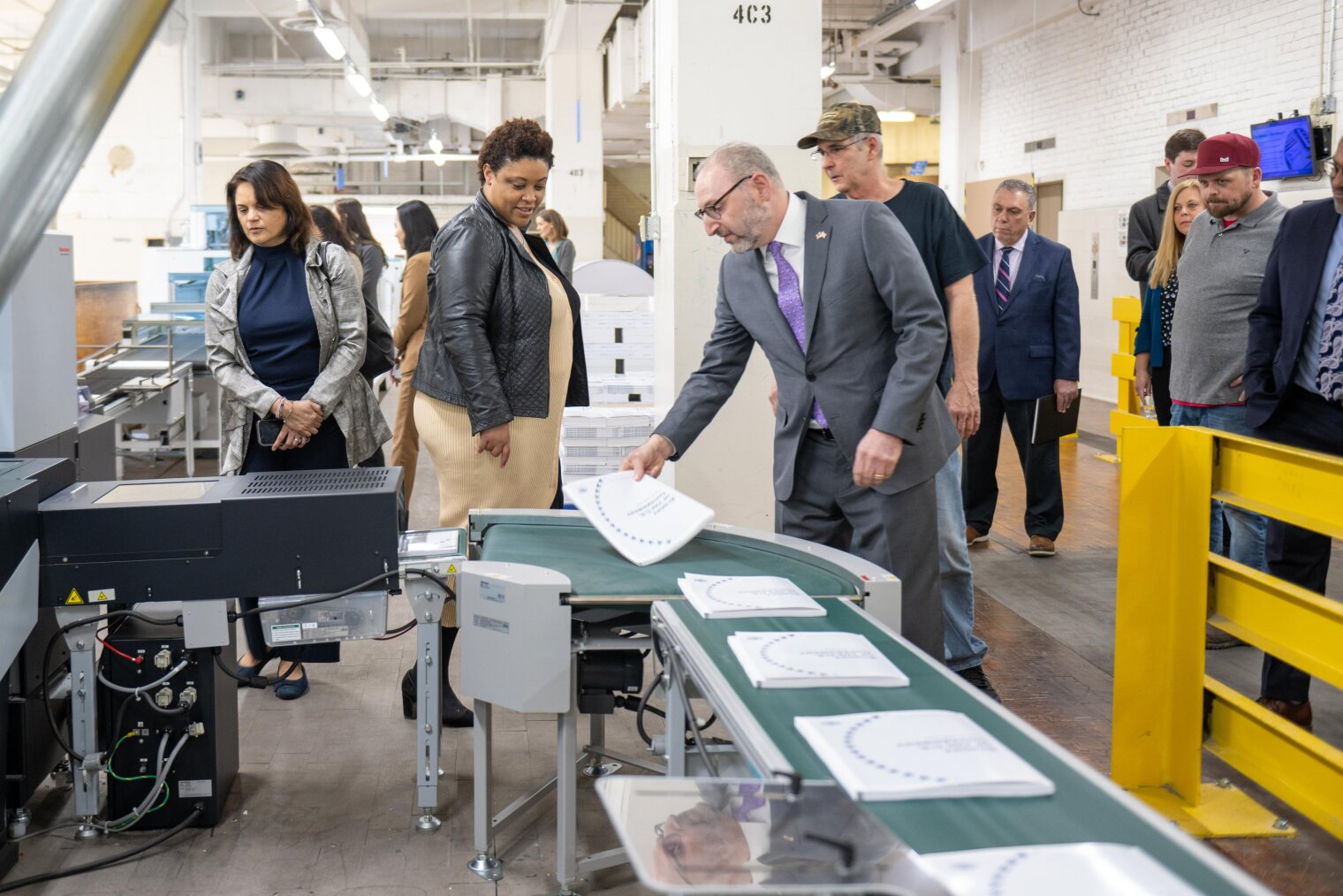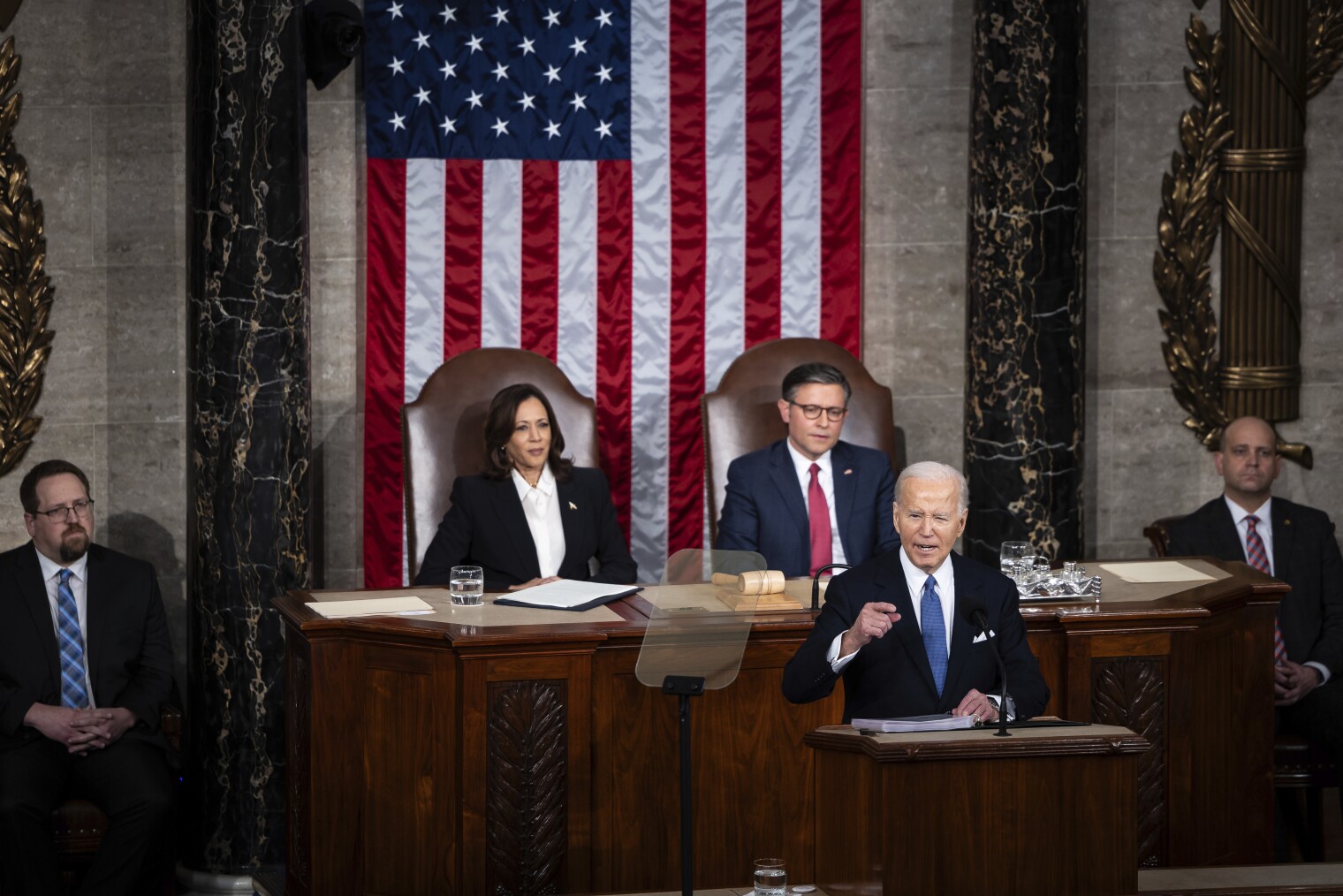| |
| FYI: Science Policy News from AIP |
| THIS WEEK |
|
|
|
|
|
|
| What’s Ahead |
 |
| White House Office of Management and Budget Director Shalanda Young, second from left, views copies of the president’s budget request being printed by the Government Publishing Office. (GPO) |
Most Non-Defense Science Agencies Would See Increases Under FY25 Budget
President Joe Biden is seeking to raise the budgets of most non-defense science agencies for fiscal year 2025, though the increases are dampened by the budget cuts Congress just made to many science agencies for fiscal year 2024. Biden submitted his budget request to Congress on March 11, and congressional committees will hold hearings with science agency leaders over the coming weeks to review the details as they prepare their own spending proposals.
Among the most favored agencies in the request are the National Institute of Standards and Technology and the National Science Foundation. NIST’s base budget (excluding earmarks) would increase nearly 30% to $1.50 billion and NSF’s budget would increase 12% to $10.18 billion. Other major funders of the physical sciences would see smaller increases. The budget of the Department of Energy’s Office of Science would increase 4% to $8.58 billion and the budget for NASA’s Science Mission Directorate would increase 3% to $7.57 billion, only partially reversing the 6% cut it just received for fiscal year 2024.
A notable exception to the trend of budget increases for non-defense agencies is that the National Oceanic and Atmospheric Administration’s Office of Oceanic and Atmospheric Research would be cut 11% to $646 million. As for defense agencies, the budget requests steep cuts to the Department of Defense’s portfolio of early-stage science and technology programs, seeking a total of $17.2 billion, down from the fiscal year 2023 level of $22.3 billion and similar to the amount requested for fiscal year 2024. In recent years Congress has routinely exceeded presidents’ budget requests for DOD’s science and technology portfolio, though it has yet to finalize the department’s appropriation for fiscal year 2024.
Science and Engineering Indicators Report Set for Release
The National Science Board will release the biennial Science and Engineering Indicators report on Wednesday at a live-streamed rollout event hosted by the White House Office of Science and Technology Policy. The S&E Indicators report compiles data about the composition of the U.S. research enterprise and its trajectory relative to that of other nations, complementing thematic reports released throughout the year. Previewing this year’s edition, the board stated the Indicators report shows that China has surpassed the U.S. in “STEM talent production, research publications, patents, and knowledge-and technology-intensive manufacturing.” The board also noted it has “sounded the alarm” over the past decade about this trend and lamented that the U.S. has not followed through on the science budget targets proposed in the CHIPS and Science Act. For instance, Congress just cut the National Science Foundation’s budget by 8% to $9 billion, whereas the act proposed NSF receive $15.6 billion in fiscal year 2024.
House to Press Case for Cutting Russian Nuclear Fuel Imports
The House Foreign Affairs Committee will explore U.S. efforts to cut ties with Russia’s nuclear industry at a Tuesday hearing focused on the state energy corporation Rosatom, a major exporter of nuclear fuel and technology. The House passed a bill in December 2023 that would restrict imports of low-enriched uranium from Russia, and a similar bill has bipartisan backing in the Senate. House Republicans have also called for further sanctions on Rosatom to hinder its cooperation with China. Congress has already moved to reduce dependence on Russian nuclear fuel through the Nuclear Fuel Security Act of 2023 and related appropriations measures, which focus on establishing a domestic supply of high-assay low-enriched uranium. HALEU fuel is needed for many proposed advanced reactors and Russia is currently the dominant global supplier. Congress has permitted DOE to repurpose up to $2.7 billion in previously appropriated infrastructure funds to implement the Nuclear Fuel Security Act.
PCAST to Meet with UK Science Advisors
The President’s Council of Advisors on Science and Technology will meet on Friday with the UK Prime Minister’s Council for Science and Technology to discuss “global challenges.” The councils will hear presentations from Derek Cummings, a professor of emerging pathogens at the University of Florida; Judith Green, a professor of health and medicine sociology at the University of Exeter; Sarah Kapnick, chief scientist of the National Oceanic and Atmospheric Administration; and Nick Pidgeon, professor of environmental psychology and risk at Cardiff University. In a separate session, PCAST will consider approving a report on “reducing diet-related diseases and food insecurity through advancing nutrition science.”
|
|
| In Case You Missed It |
 |
| President Joe Biden delivers the 2024 State of the Union Address. (Francis Chung/POLITICO/AP) |
Biden Touches on Research in Address to Congress
In his State of the Union address last week, President Joe Biden mentioned a few of his priority research and technology initiatives in a speech focused on making his case for reelection. Biden said the CHIPS and Science Act has helped boost domestic semiconductor manufacturing and claimed the U.S. is now “investing more in research and development than ever before.” He called for Congress to continue supporting the new Advanced Research Projects Agency for Health (ARPA–H) as part of an effort to “do big things like end cancer as we know it,” the goal of his Cancer Moonshot. He also highlighted the recent launch of the White House Initiative on Women’s Health Research, led by First Lady Jill Biden, which he said is motivated by the fact that such research “has always been underfunded.” In a brief mention of efforts to mitigate climate change, Biden reiterated his goal of cutting carbon emissions in half by 2030 and highlighted his nascent Climate Corps workforce training initiative. Commenting on his stance toward China, Biden said, “I want competition with China, not conflict.” Alluding to his expansion of export controls, he said “I’ve made sure that the most advanced American technologies can’t be used in China.” He also noted that he has worked to expand technological alliances with other countries in the region, such as the “Quad” partnership with India, Australia, and Japan. In concluding his speech, Biden urged Congress to pass legislation to “harness the promise of AI to protect us from peril,” in part by banning AI voice impersonations.
Senate Passes Radiation Exposure Compensation Act
By a 69-30 vote, the Senate passed legislation last week that would expand the types of atmospheric nuclear testing and nuclear material exposure covered by the Radiation Exposure Compensation Act as well as the time window for damage claims. Specifically, people exposed to atmospheric nuclear tests in Nevada and the Pacific from 1958 to 1962 would now be eligible for damage claims. The current law limits claims relating to atmospheric testing to parts of Arizona, Nevada, and Utah; the bill would expand that area to include all of those states as well as Colorado, Idaho, Montana, New Mexico, Utah, and Guam. The bill also expands the list of uranium mining-related jobs that qualify for compensation, notably adding workers involved in remediation efforts at uranium mines and mills. It extends the coverage to include mines that operated through 1990, instead of through 1971. In addition, the bill creates a new claim eligibility for people affected by Manhattan Project waste in Missouri, Tennessee, Alaska, and Kentucky. The compensation fund itself is set to expire in June, following a previous extension that Congress passed in 2022. The new legislation would extend the fund to 2030. The bill is sponsored by Sen. Josh Hawley (R-MO), who has frequently drawn attention to the enduring effects of radiological contamination in his state. The Biden administration has endorsed the legislation.
Barrasso Quizzes DOE on China Interactions
Senate Energy and Natural Resource Committee Ranking Member John Barrasso (R-WY) sent a letter to the Department of Energy last week expressing concern over a series of meetings between DOE officials and representatives of the Chinese government. The letter asserts the meetings “went beyond mere diplomatic courtesies” and, in some cases, “served as forums in which the taxpayer-funded research and development of our national labs was offered up for the benefit of Chinese state-owned enterprises and, by extension, the Chinese Communist Party.” The meetings, such as one between the director of DOE’s China Office and the president of the state-owned China Construction Technology Company were publicized only in Chinese-media, Barrasso wrote, raising “significant concern about DOE’s transparency and broader collaboration with the CCP.” His letter requests a list of all trips taken by DOE employees to China, as well as details of how staff are prepared for these visits, and a justification for DOE’s “conscious decision not to publicize these meetings.” A DOE spokesperson defended the meetings in a statement to news outlets. “Global collaboration on key issues — such as basic scientific research and addressing the climate crisis — are critical to sustaining America’s global leadership while promoting greater prosperity and economic growth for generations to come,” the spokesperson wrote. “To that end, department officials have and will continue to strategically engage with partners and competitors from across the globe to protect and promote American innovation, advance our technological competitiveness, and strengthen our national security.”
Input on AI Sought by DOE and NTIA
The Department of Energy and the National Telecommunications and Information Administration are soliciting public comments to inform reports mandated by President Joe Biden’s recent executive order on artificial intelligence. NTIA is seeking input by March 27 on the “potential risks, benefits, other implications, and appropriate policy and regulatory approaches to dual-use foundation models for which the model weights are widely available.” DOE is seeking input by April 1 on a report that will detail AI’s potential to forecast the impacts of climate change and to improve electric grid planning and resilience.
|
|
| Upcoming Events |
All events are Eastern Time, unless otherwise noted. Listings do not imply endorsement. Events beyond this week are listed on our website.
Tuesday, March 12
Wednesday, March 13
Thursday, March 14
Friday, March 15
No events.
Monday, March 18
Know of an upcoming science policy event either inside or outside the Beltway? Email us at fyi@aip.org.
|
|
| Opportunities |
|
Deadlines indicated in parentheses.
Job Openings
Solicitations
Know of an opportunity for scientists to engage in science policy? Email us at fyi@aip.org.
|
|
| Around the Web |
|
News and views currently in circulation. Links do not imply endorsement.
White House
Congress
Science, Society, and the Economy
Education and Workforce
Research Management
Labs and Facilities
Computing and Communications
Space
Weather, Climate, and Environment
Energy
Defense
Biomedical
International Affairs
|
|
|
| |
| This message is sent to you because your email address is on our subscribers list. To manage your FYI preferences and subscriptions, please click here . Or you can unsubscribe from all emails from AIP. AIP, 1 Physics Ellipse, MD 20740-3841
301.209.3100 - newsletters@aipcomm.org As a 501(c)(3) non-profit, AIP is a federation that advances the success of our Member Societies and an institute that engages in research and analysis to empower positive change in the physical sciences. The mission of AIP (American Institute of Physics) is to advance, promote, and serve the physical sciences for the benefit of humanity. |
|
| © 2024. American Institute of Physics |
|
|